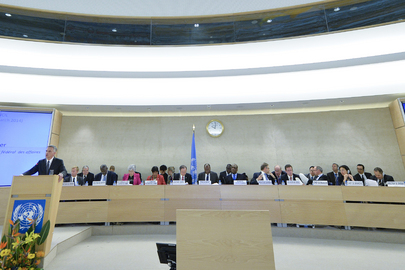Latest NEWS
- Aswat Masriya, the last word
- Roundup of Egypt's press headlines on March 15, 2017
- Roundup of Egypt's press headlines on March 14, 2017
- Former Egyptian President Hosni Mubarak to be released: lawyer
- Roundup of Egypt's press headlines on March 13, 2017
- Egypt's capital set to grow by half a million in 2017
- Egypt's wheat reserves to double with start of harvest -supply min
- Roundup of Egypt's press headlines on March 12, 2017
Egypt to study over 300 human rights recommendations submitted at UPR

CAIRO, Nov 7 (Aswat Masriya) - Egypt vowed to study over 300 recommendations submitted on Friday by around 122 states which have questioned its human rights record during the Arab country's second Universal Periodic Review (UPR).
The UPR session, held at the United Nations Human Rights Council in Geneva on Wednesday, reviewed the country's human rights record throughout four years which have witnessed Egypt’s most politically volatile conditions in decades.
The session was preceded by wide criticism for Egypt's rights record by domestic and international civil society organisations, as well as the Muslim Brotherhood.
Egypt's ministry of transitional justice said in a Friday statement that the country received around 314 recommendations.
"Seventeen recommendations were issued more than once," the statement read. "Around 219 recommendations have already been practically implemented throughout the past three years."
The ministry said Egypt will announce its final stance toward the recommendations in March.
Egypt's official delegation to the UPR, headed by Minister of Transitional Justice and the House of Representatives Ibrahim al-Heneidi, arrived in Geneva on Sunday to prepare for the review.
The government submitted its report on the human rights status during the past four years in July.
Addressing the Human Rights Council, Heneidi said on Wednesday that Egypt witnessed a "leap" in the status of human rights.
The Brotherhood and its Freedom and Justice Party announced on Saturday having prepared an "alternative" report "to expose the atrocious reality of the military dictatorship ruling Egypt."
The Muslim Brotherhood has come under attack since the military ouster of its leader Mohamed Mursi from the presidency in July 2013 following mass protests against his rule. The military-installed regime has since then rounded up thousands of Brotherhood members and supporters and killed hundreds of protesters in confrontations with security forces.
Egypt listed the Brotherhood as a terrorist organisation last December and insists it is behind the stringent wave of militancy which has targeted security personnel since Mursi's ouster. The Brotherhood continuously denies the accusations, distancing itself from one militant attack after the other.
International watchdog Human Rights Watch described the situation in Egypt as "the most dramatic reversal of human rights in Egypt’s modern history under President Abdel Fattah al-Sisi."
In a statement released ahead of the UPR on Tuesday, the organisation urged Egypt’s allies, especially the United States, to hold the country to account regarding its abuse of human rights.
The U.S. expressed during Wednesday's session its "deep concern with steps taken by Egypt that have resulted in violations of freedom of expression, peaceful assembly and association".
Turkey condemned what it described as a "systematic and widespread use of unlawful lethal force by the (Egyptian) security forces..." The country was closely affiliated with the Muslim Brotherhood regime and its president Recep Tayyip Erdo?an has long condemned Mursi's military ouster.
Britain meanwhile addressed "the decreasing space for civil society and the media to operate".
The Forum of Independent Human Rights Organisations, comprised of 19 domestic rights groups, submitted in March its independent report to the UN Human Rights Council, where it tracked "huge deterioration" in Egypt’s human rights record during the past four years.
Seven members of the forum announced on Tuesday night their withdrawal from the UPR due to fear of "retaliatory measures or persecution" by the Egyptian authorities.
Egypt's first UPR was held in 2010, shortly before former Egyptian President Hosni Mubarak was toppled. It was given 165 recommendations to promote human rights.
Heneidi said on Wednesday the country has already adopted 119 of the recommendations and is moving forward with adopting 25 more "despite being occupied with the pressing domestic situation."
The UPR is held for each UN member-state every four years to assess its human rights conditions.
Egypt’s UPR session is moderated by three countries; Saudi Arabia, the Ivory Coast and Montenegro.










